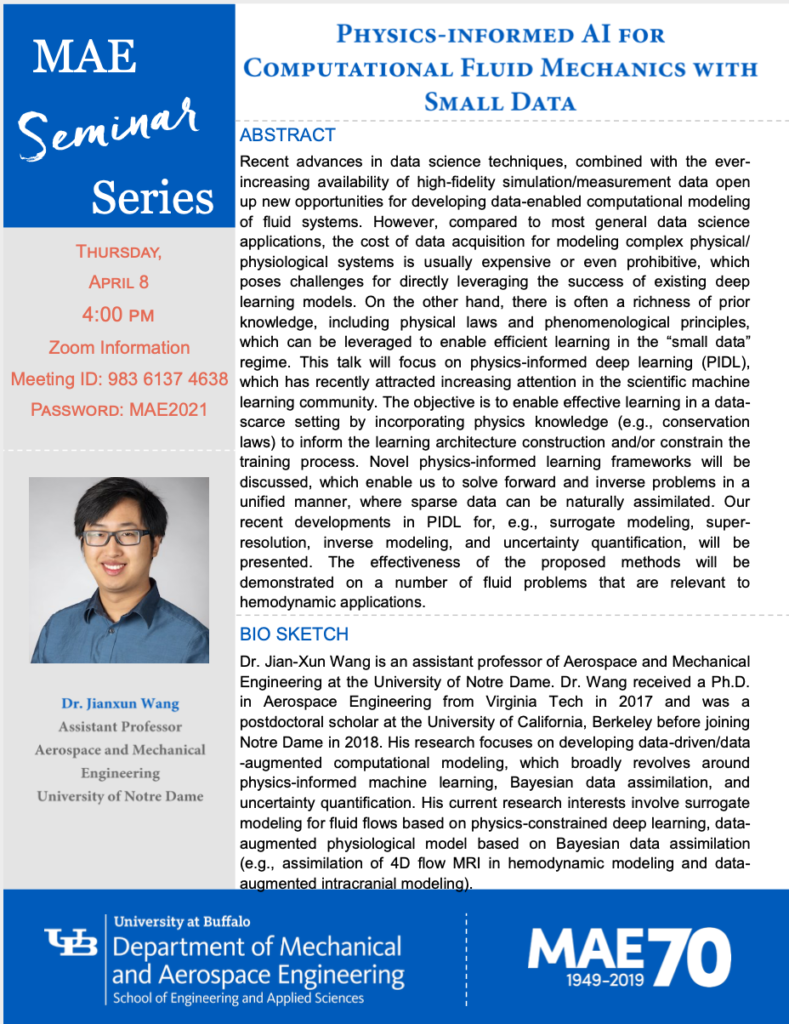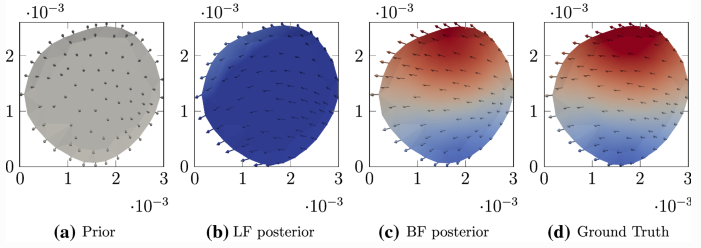Congrats to Pan Du on his first publication in PLoS One
- H. Wu, P. Du*, R. Kokate, J.-X. Wang, A semi-analytical solution and AI-based reconstruction algorithms for magnetic particle tracking, PLoS ONE, 16(7): e0254051, 2021. [Arxiv, DOI, bib]

Congrats to Pan Du on his first publication in PLoS One





I will organize a mini-symposium entitled “Physics Informed Learning for Modeling and Discovery of Complex Systems” Parts I and II on 03/03/2021 at SIAM CSE. Moreover, our group will also give several talks at CSE21.
MS Talk: Wang et al. Physics-Informed Discretization-Based Learning: a Unified Framework for Solving PDE-Constrained Forward and Inverse Problem (2:15-2:30 CST, 03/03/2021) https://meetings.siam.org/sess/dsp_talk.cfm?p=108358
MS Talk: Han et al. Suppreresolution and Denoising of Flow Imaging using Physics-Constrained Discrete Learning (4:35-4:50 CST, 03/01/2021) https://meetings.siam.org/sess/dsp_talk.cfm?p=108020
MS Talk: Sun et al. System Identification by Sparse Bayesian Learinng (5:35-5:50 CST, 03/04/2021) https://meetings.siam.org/sess/dsp_talk.cfm?p=108437
Poster: Pan et al. Patient-Specific CFD Modeling of Aortic Dissection Augmented with 4D Flow MRI https://meetings.siam.org/sess/dsp_talk.cfm?p=110813
H. Gao*, J.-X. Wang, A Bi-fidelity Ensemble Kalman Method for PDE-Constrained Inverse Problems, Computational Mechanics

Mathematical modeling and simulation of complex physical systems based on partial differential equations (PDEs) have been widely used in engineering and industrial applications. To enable reliable predictions, it is crucial yet challenging to calibrate the model by inferring unknown parameters/fields (e.g., boundary conditions, mechanical properties, and operating parameters) from sparse and noisy measurements, which is known as a PDE-constrained inverse problem. In this work, we develop a novel bi-fidelity (BF) ensemble Kalman inversion method to tackle this challenge, leveraging the accuracy of high-fidelity models and the efficiency of low-fidelity models. The core concept is to build a BF model with a limited number of high-fidelity samples for efficient forward propagations in the iterative ensemble Kalman inversion. Compared to existing inversion techniques, salient features of the proposed methods can be summarized as follow: (1) achieving the accuracy of high-fidelity models but at the cost of low-fidelity models, (2) being robust and derivative-free, and (3) being code non-intrusive, enabling ease of deployment for different applications. The proposed method has been assessed by three inverse problems that are relevant to fluid dynamics, including both parameter estimation and field inversion. The numerical results demonstrate the excellent performance of the proposed BF ensemble Kalman inversion approach, which drastically outperforms the standard Kalman inversion in terms of efficiency and accuracy.

Recently, the advent of deep learning has spurred interest in the development of physics-informed neural networks (PINN) for efficiently solving partial differential equations (PDEs), particularly in a parametric setting. Among all different classes of deep neural networks, the convolutional neural network (CNN) has attracted increasing attention in the scientific machine learning community, since the parameter-sharing feature in CNN enables efficient learning for problems with large-scale spatiotemporal fields. However, one of the biggest challenges is that CNN only can handle regular geometries with image-like format (i.e., rectangular domains with uniform grids). In this paper, we propose a novel physics-constrained CNN learning architecture, aiming to learn solutions of parametric PDEs on irregular domains without any labeled data. In order to leverage powerful classic CNN backbones, elliptic coordinate mapping is introduced to enable coordinate transforms between the irregular physical domain and regular reference domain. The proposed method has been assessed by solving a number of steady-state PDEs on irregular domains, including heat equations, Navier-Stokes equations, and Poisson equations with parameterized boundary conditions, varying geometries, and spatially-varying source fields. Moreover, the proposed method has also been compared against the state-of-the-art PINN with fully-connected neural network (FC-NN) formulation. The numerical results demonstrate the effectiveness of the proposed approach and exhibit notable superiority over the FC-NN based PINN in terms of efficiency and accuracy.
| Please check out our presentations at APS DFD: R01.00011: Super-resolution and Denoising of Fluid Flows Using Physics-informed Convolutional Neural Networks Jian-Xun Wang, Han Gao, Luning Sun R01.00038: A unifying framework of solving forward and inverse problems in fluid mechanics via deep learning Han Gao, Jian-Xun Wang R10.00002 Physics-constrained multi-fidelity convolutional neural networks for surrogate fluid modeling Luning Sun, Han Gao, Jian-Xun Wang W07.00012 Computational simulation of aortic dissection with a comparison with 4D flow MRI Pan Du, Nicholas Burris, Julio Sotelo, Jian-Xun Wang http://meetings.aps.org/Meeting/DFD20/Content/3927 |
Speaker: Jian-Xun Wang, Date / Time: Nov. 12, 2020, 11:00 – 12:00 pm, Location: (Virtual)
Abstract
Recent advances in data science techniques, combined with the ever-increasing availability of high-fidelity simulation/measurement data open up new opportunities for developing data-enabled computational modeling of fluid systems. However, compared to most computer science applications, the cost of data acquisition for modeling complex physical/physiological systems is usually expensive or even prohibitive, which poses challenges for directly leveraging the success of existing deep learning models. On the other hand, there is often richness of prior knowledge, including physical laws and phenomenological principles, which can be leveraged to enable efficient learning in the “small data” regime. This talk will focus on physics-informed deep learning (PIDL), which has recently attracted increasing attention in the scientific machine learning community. The objective is to enable effective learning in a data-scarce setting by incorporating physics knowledge (e.g., conservation laws) to inform the learning architecture construction and/or constrain the training process. Our recent developments in PIDL for, e.g., surrogate modeling, super-resolution, and uncertainty quantification, will be presented. The effectiveness of the proposed methods will be demonstrated on a number of fluid problems that are relevant to hemodynamic applications.